The sun shone brightly on Christmas morning 1776 as George Washington plotted his next move. The American Revolution was less than a year old and appeared doomed. The situation could scarcely have been worse.
Washington’s army was a defeated mess. In less than a year, the Continental Army and its supporting state militias had been chased out of Boston and New York City. The British chased them across New Jersey and were closing in on Philadelphia. In anticipation of the British attack, the Continental Congress fled Philadelphia sinking the currency backed by the Continental Congress, making it difficult to buy weapons and supplies for the army.
Washington knew he had about one week to save the entire rebellion. At the end of December, most of his army would disappear when their short-term enlistment period expired. Recruitment efforts floundered because few people wanted to enlist in a lost cause.
Success in war depends on luck as much as good leadership, and Washington’s luck was about to change. First, the British decided to call off their advance and settle into winter quarters. Second, the British believed the Americans were inferior fighters compared to their well-trained, well-supplied professional army. As soon as the weather improved, they planned to crush the rebellion.
While the British got warm and comfortable at various fortified encampments in New Jersey, Washington dreamed up a complicated plan to attack them. He chose Trenton because it was isolated from the other British encampments and was close to the Delaware River. Trenton was held by Hessians, the 18th-century mercenaries preferred by any monarch who could afford to hire them.
Washington’s plan was complicated because his troops had to cross the Delaware River at night, then march eight miles to Trenton and simultaneously attack from two directions. Around 2 p.m. on Christmas Day as the Americans marched toward the river, a winter storm blew in. Many of the troops walked barefoot through the freezing rain and snow because they’d worn out their boots on the long marches earlier in the year.
Washington’s genius as a commander was to remain calm and outwardly confident in the most of dire circumstances. He inspired his men to keep going. Somehow they managed to cross the partially frozen Delaware River in wooden boats, taking their cannons along. The event is memorialized in Emanuel Leutze’s 1851 painting, “Washington Crossing the Delaware.”
Across the river, the Americans reformed into their battlegroups and began lugging their cannons toward Trenton. The atrocious weather delayed their arrival from dawn to about 8 a.m. on December 26th.
The popular myth is that the Hessian troops were taken by surprise after having too much to drink during their Christmas celebrations. Actually, the Hessians were sober and had been warned about the attack. But they made the same mistake as the British; they believed the American army was inferior to them and besides, no one would be crazy enough to attack at night in a snowstorm.
At about 8 a.m. on December 26th, the Americans simultaneously attacked Trenton from the north and the south. Trenton was unusual in that it had been built on a grid. The perfectly aligned streets provided an excellent field of fire for the American cannons and sharpshooters.
Some Hessians escaped to the edge of town but were attacked before they could counterattack. During this brief melee, the Hessian commander was mortally wounded and the Hessians surrendered. The Hessians lost 40 killed, 66 wounded and 918 captured. Americans lost 4 killed, 8 wounded, and 5 frozen to death during the march from the river.
The Battle of Trenton is considered the turning point in the American Revolution by many historians. Thanks to this win, American morale soared, recruitment improved and the long grinding war continued until the British surrendered at Yorktown in 1781. Trenton was Washington’s Christmas present for a nation that didn’t yet exist.
For a quick overview of the war, see A Guide to the Battles of the American Revolution, by Theodore P. Savas and J. David Dameron (2006). Of the many biographies of George Washington that I’ve read, my current favorite is Washington: A Life, by Ron Chernow (2010). Chernow also wrote a biography of Alexander Hamilton that inspired Lin-Manuel Miranda’s musical.
Want to receive this blog straight to your inbox? Sign up for my mailing list.




